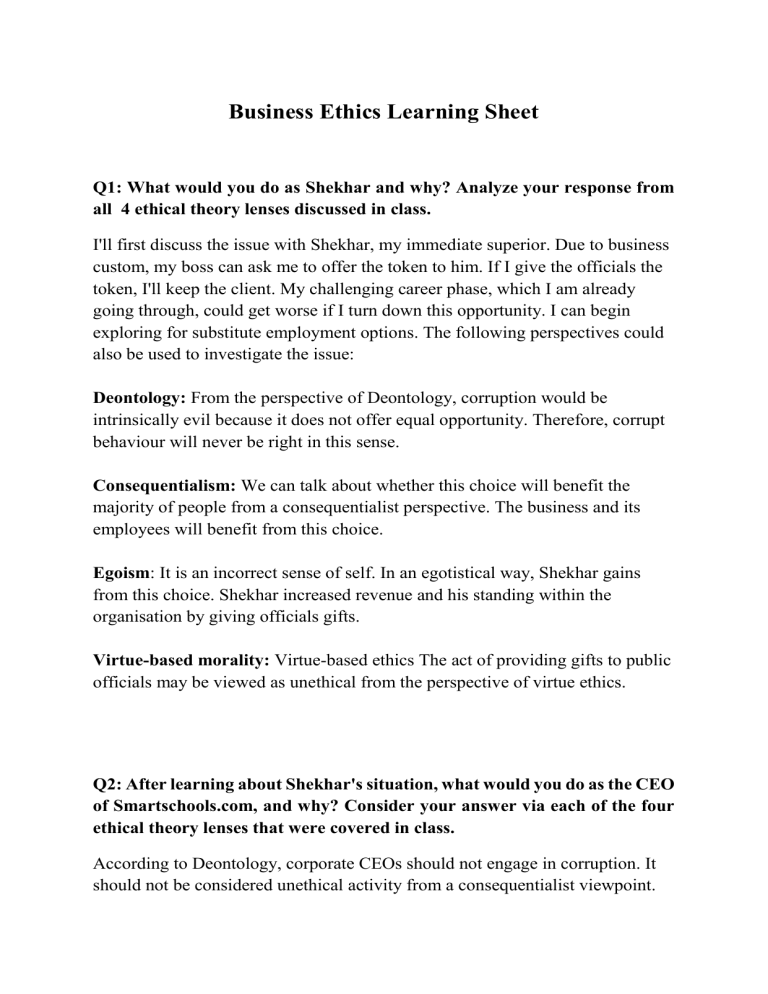
Business Ethics Learning Sheet Q1: What would you do as Shekhar and why? Analyze your response from all 4 ethical theory lenses discussed in class. I'll first discuss the issue with Shekhar, my immediate superior. Due to business custom, my boss can ask me to offer the token to him. If I give the officials the token, I'll keep the client. My challenging career phase, which I am already going through, could get worse if I turn down this opportunity. I can begin exploring for substitute employment options. The following perspectives could also be used to investigate the issue: Deontology: From the perspective of Deontology, corruption would be intrinsically evil because it does not offer equal opportunity. Therefore, corrupt behaviour will never be right in this sense. Consequentialism: We can talk about whether this choice will benefit the majority of people from a consequentialist perspective. The business and its employees will benefit from this choice. Egoism: It is an incorrect sense of self. In an egotistical way, Shekhar gains from this choice. Shekhar increased revenue and his standing within the organisation by giving officials gifts. Virtue-based morality: Virtue-based ethics The act of providing gifts to public officials may be viewed as unethical from the perspective of virtue ethics. Q2: After learning about Shekhar's situation, what would you do as the CEO of Smartschools.com, and why? Consider your answer via each of the four ethical theory lenses that were covered in class. According to Deontology, corporate CEOs should not engage in corruption. It should not be considered unethical activity from a consequentialist viewpoint. This is common practice and benefits everyone in the organization. Shekhar may be transferred to another department or job that does not involve ethical issues. Q3: Considering what was read for today's session (PFA): Review the ethicality of your responses supplied using A Framework for Ethical Reasoning. Issues 1 and 2 To judge the ethicality of the answers, we must address the following four questions: Is it my duty to protect other people's rights? By alerting the superior about the situation, I am being truthful to my company? You must choose whether to quit your job or offer them a gesture of appreciation for working for the company if your manager claims it is standard procedure and you must adhere to it in order to keep the business running. It exists. If I decline the offer and leave the company, my rival will seize ownership from me. In either case, my career is struggling, so I need to choose carefully. By presenting the Certification Mark, I satisfy my duties to the organisation. And when this behaviour disturbs me, I hunt for options for alternative jobs. Am I adhering to the community's norms? Let's start by talking about the entire Smart School community. By expressing gratitude and completing customer orders, I will demonstrate respect for and accountability to our organisation. But by doing so, I'm putting the company in danger. If this is found out, it can result in bad press. Second, we must think about how it impacts the community's idioms, traditions, and culture. By doing this, we spread common practises more widely. People will note that Shekhar, who is renowned for his morality, engages in these behaviours and expands the application of this norm. Am I keeping my word and the word of my employer? I have responsibilities as an area manager, thus in this case I am able to uphold my agreement with Smart School. Conscious me is also committed to myself, therefore engaging in these things over the long haul has an impact on me. If this position does not satisfy you, you should start exploring for other work options.





